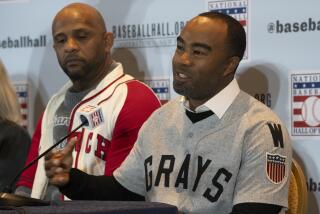PASSINGS: Ray Grebey, John ‘Juke’ Logan
Ray Grebey
Headed baseball negotiations
during 1981 players strike
Ray Grebey, 85, who led Major League Baseball labor negotiations during the tumultuous 50-day strike that split the 1981 season, died Aug. 28 in Stamford, Conn. His family said he had stomach cancer.
Hired by baseball owners in 1978 after 20 years at General Electric Co., Grebey succeeded John Gaherin as the sport’s chief labor negotiator. After arbitrator Peter Seitz struck down the reserve clause, Gaherin worked out the deal in 1976 that created free agency.
Grebey went up against longtime union head Marvin Miller in the 1980-81 labor talks, which led to a bruising work stoppage over the issue of compensation for free agents.
Players struck the final eight days of spring training in 1980, forcing cancellation of 92 exhibition games, and the sides agreed that May to a four-year contract that allowed the issue of free agent compensation to be reopened the next season.
Players struck again June 12, 1981, the first midseason stoppage in the sport’s history, and they didn’t reach an agreement until July 31. The terms of the settlement were similar to the union’s original proposal. Compensation would come from a pool of players, not from the team signing a free agent.
The compensation draft was dropped in the 1985 negotiations, and the last remaining vestige — amateur draft-pick compensation — was eliminated last year.
“He had a very difficult task but performed it professionally and with courtesy,” said former players’ association head Donald Fehr, who became Miller’s top lawyer in 1977.
Despite the bitter talks, Grebey in 2009 urged the Hall of Fame to induct Miller, who died last year and is eligible for the ballot again this December.
Clarence Raymond Grebey Jr. was born in Chicago on March 10, 1928. He graduated from Kenyon College, received an MBA degree from the University of Chicago and served in the U.S. Army in Korea.
Grebey left baseball in 1982 and became a vice president with Pan American World Airways. He left Pan Am in 1989 to become a founding executive of the Trump Shuttle.
John ‘Juke’ Logan
Blues harmonica player,
singer and bandleader
John “Juke” Logan, 66, a Los Angeles-based blues harmonica player whose wailing melodies can be picked out of the theme music for the 1990s TV sitcoms “Roseanne” and “Home Improvement,” died Aug. 30 at his home in Joshua Tree, Calif.
The cause was complications of esophageal cancer, said longtime friend Dan Duehren, co-founder of California Vintage Guitar and Amp in Sherman Oaks.
An animated showman, singer and bandleader, Logan earned a reputation as a go-to harmonica player for jingles, soundtracks and other sessions.
In addition to television shows, Logan’s work appeared in films, including “Crossroads,” “La Bamba” and “Streets of Fire,” and on commercials, from Jack in the-Box to cherry Coca-Cola. He also served as a music consultant for the 1999 animated film “The Iron Giant.”
He played with a number of recording artists, including Ry Cooder, Leon Russell, Dave Alvin, Albert Collins, Big Joe Turner and John Lee Hooker. Logan also wrote songs for John Mayall, Poco and others.
Logan’s first solo album, “The Chill,” was released in 1995. He went on to record four more albums on his label, Mocombo Records.
John Farrell Logan was born Sept. 11, 1946, in downtown Los Angeles. Growing up in North Hollywood, Logan fell in love with Chicago-style blues and the soulful harmonica stylings of James Cotton and Little Walter.
His incessant rehearsals of the Little Walter track “Juke” led to a nickname that stuck for life.
He graduated from USC with a business degree but set his sights on a career in music, forming Los Angeles-based bands in the 1970s and ‘80s such as the Juke Rhythm Band and the Angel City Rhythm Band.
Between 1992 and 2000, Logan and Ellen Bloom hosted a two-hour radio show on KPCC-FM (89.3) called “The Friday Night Blues Revue.”
He was diagnosed with esophageal cancer in 2009 and underwent surgery to treat it. The cancer returned in 2011.
In April, members of the Southern California blues and roots communities gathered at Cafe Fais Do Do in Los Angeles for a benefit concert to salute Logan and raise money for the American Institute for Cancer Research.
Times staff and wire reports
More to Read
Start your day right
Sign up for Essential California for the L.A. Times biggest news, features and recommendations in your inbox six days a week.
You may occasionally receive promotional content from the Los Angeles Times.






